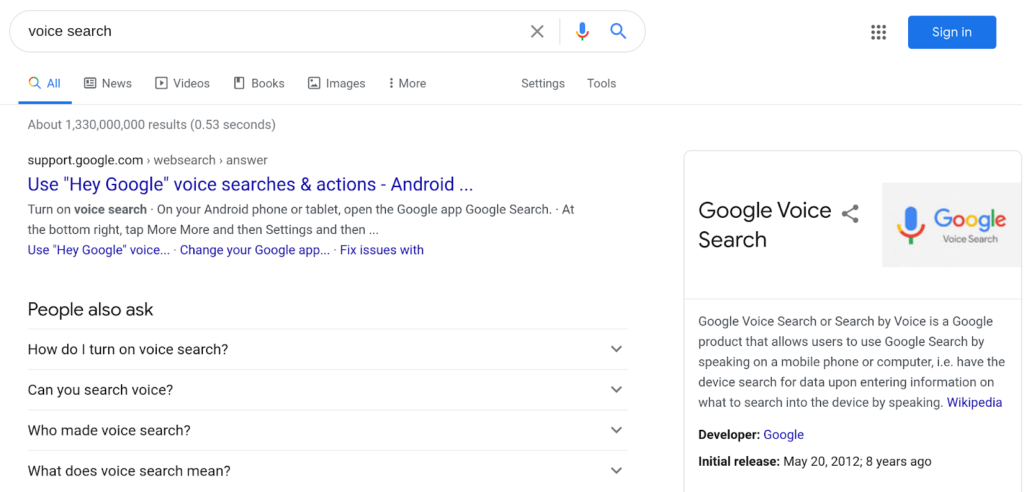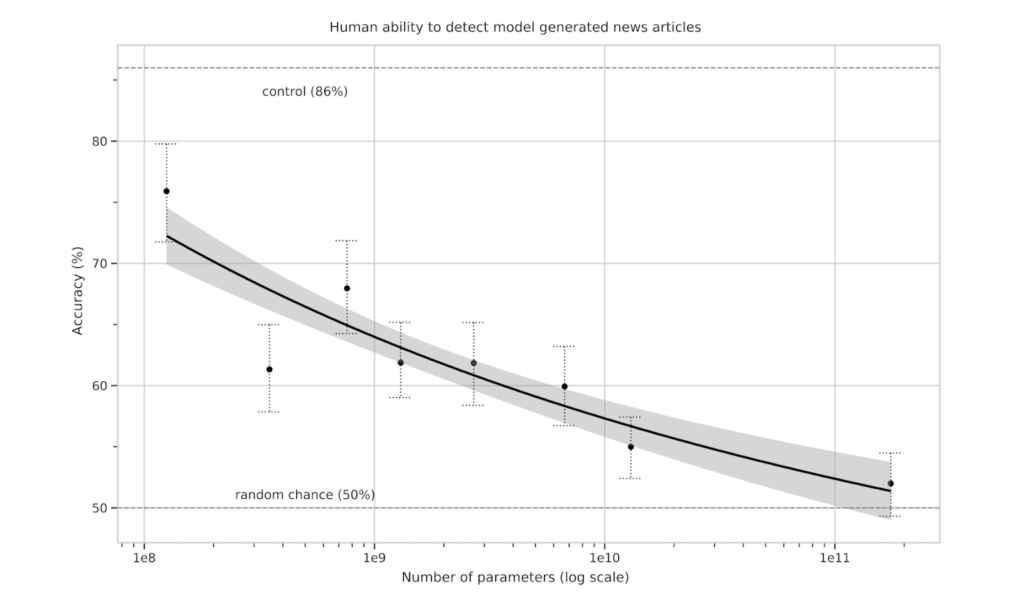- AI SEO employs Artificial Narrow Intelligence to improve algorithms, enhance keyword research, deliver competitor analysis, and promises more for the future of SEO.
- Google Discover currently delivers AI-driven predictive content to over 800 million users worldwide every month.
- As early as 2016 Google revealed 20 percent of user searches on Android devices and the Google mobile app were voice search.
- Machine learning for SEO can be accomplished using available AI products like IBM Watson Studio and the Google Cloud AI platform.
Science-fiction authors have long mused on advanced artificial intelligence and often predict shocking consequences for humanity as a result. For decades, gamers have had a tactile relationship with basic forms of AI featured in games from Pac-Man to Grand Theft Auto. With the exception of Computer Scientists, SEO specialists arguably have the most symbiotic relationship with machine learning and AI.
The future of SEO is as much tied to the progress of artificial intelligence as computer information technology itself. Machine learning for SEO is rapidly proving to be an integral part of good digital marketing strategy. Similarly, human SEO specialists are proving to be just as essential in the effective application of AI-powered SEO.
At Redefine Marketing Group, our team is continually searching for the best and latest tools to achieve the highest degree of optimization. Identifying new trends in AI SEO and employing new deep learning tools, along with tools already essential to our clients, is how we achieve constant improvement.
A basic understanding of a very complicated science
The layperson might struggle to grasp the mechanics of neural networks or the function of deep learning. The science of artificial intelligence is as broad as any technical field and quite literally encompasses components of multiple disciplines, including psychology, philosophy, and linguistics.
The best way to understand the full potential of AI is to first distinguish between Artificial Narrow Intelligence (ANI) and Artificial General Intelligence (AGI). The former is in practical use today, and denotes artificial intelligence technology which outperforms humans in some very narrowly defined task. AGI is at present still a hypothetical concept, and describes machine intelligence with the capacity to learn or perfect any intellectual task that a human being can.
Today’s AI SEO tools employ a variety of ANI technologies programmed to discover related keywords, enhance keyword research, improve algorithms, increase speed, deliver competitor analysis, research search intent, and more.
Though AGI has the potential to expand machine learning for SEO well beyond the limits of ANI, the future of SEO remains bound by today’s more narrow applications. However impressive, today’s AI-powered SEO empowers human-developed strategies rather than replacing SEO specialists outright.
AI change is gonna come
The ongoing evolution of digital marketing has proven our industry to be one adept at responding to technological changes in SEO, content marketing, and social media.
SEO specialists today still rely on the same fundamental tools established with the earliest SERPs. With deep learning now among the arsenals of search and eCommerce entities alike, an effective strategy must follow trends and incorporate factors like UX, mobile SEO, voice search, and social media marketing, among others.
Like cybernetic implants or mutant superpowers, AI SEO has the potential to launch a mild-mannered SEO specialist into heroic territory. Today’s machine learning for SEO automates the processing of real-time data with unprecedented facility. This is critical for the future of SEO since search engine neural networks in play today are at work improving various types of keyword, image, and voice search.
Deep learning is revolutionizing the UX experience. Spam links and black hat tactics are constantly targeted by search engine neural networks and are continually learning to improve at this task. In general, tomorrow’s SEO specialist will be one who embraces and integrates these technologies to better think “like the machine” rather than outsmart it.
Machine learning and SEO: Our predictions (#1-3)
The collective minds at Redefine Marketing Group anticipate six key facets of SEO that will be vastly transformed by artificial intelligence. Machine learning for SEO is by no means limited to the following, but they represent fundamental considerations of a forward-looking strategy.
1. Search Ranking
In 2015, Google’s deployment of RankBrain marked the search engine giant’s first major investment in machine learning to process a large fraction of its queries and deliver improved search results.
But RankBrain is only one significant component of Google’s overall search algorithm and doesn’t directly handle search results. Along with PageRank and various search algorithm updates, RankBrain’s deep learning capabilities and neural networks aim to interpret user queries in a manner that resembles human intelligence.
In a 2016 Q&A, Google’s Search Quality Senior Strategist, Andrey Lipattsev, revealed what most already knew: the two most critical ranking factors are links and content. In effect, Google’s application of AI into their search algorithm served only to crystallize the importance of high-quality content.
BERT, one of Google’s latest neural network-based contributions to their algorithm, furthers its ability to deliver answers with a human-like interpretation of language and context. It employs Natural Language Processing (NLP) to interpret meaning from user search inputs. Whereas the former iteration might deliver a top result that didn’t answer the user’s question, improvements are being made to predict user intent and drive relevant links.

Since 2017, Google Discover began delivering an innovative, queryless search to mobile users. Using AI-driven recommendations, Google now serves up predictive content to over 800 million users worldwide every month and presents a new frontier for AI SEO to optimize and exploit.
At Redefine Marketing Group, our team designs client strategy by working in tandem with Google’s machine learning for SEO. By assessing data from AI-powered SEO analysis, we build expertise on singular topics, define content niche, and narrow the density of competition to elevate client ranking and traffic. We stay ahead of the game by using a combination of tools to evaluate the impact of ever-changing algorithm updates.
2. Voice Search
In 2016, Sunday Pichai revealed in his I/O keynote that 20 percent of user searches queried on Android devices and the Google mobile app were performed via voice search.
With over half of all worldwide web traffic being served on mobile devices, and a rising share of U.S. households acquiring smart speakers, the trend toward search without a screen shows no sign of diminishing. If anything, the pandemic has only convinced users in lockdown that digital assistants and voice search can be an essential way of life.
The debate may linger about the true significance of the voice search market, but there’s no denying its growth. It represents one of the most exciting changes in the search landscape, and one that SEO specialists must reckon with if they are to deliver a good strategy to clients.
Just as ranking can be determined by NLP techniques, Google’s deep learning algorithm understands the phrasing of user queries and determines not just what they’re searching for but how they’re searching. Voice searches are spoken conversationally, requiring modernized SEO optimization for long-tail queries in addition to top ranking for relevant keywords. Since these strategies also yield placement in Google’s SERP as a Featured Snippet, those snippets frequently end up as voice search results.

Redefine Marketing Group has a proven track record of accomplishing this placement for client brands time and again. Moreover, we foresee the value of this placement only increasing over time as it relates to regression analysis. Effective AI SEO must not only incorporate machine learning to determine the algorithmic shift that results in a drop in rankings, it should do so in the context of disparate search results. Only then can we determine which facet of Google’s overall algorithm is making an impact, and recalibrate our AI-powered SEO strategies to maintain weighting.
The ranking of voice search results, like featured snippets, demonstrates we can no longer think about the AI algorithm as a set of rules applied en masse. Rather, it’s an intelligent neural network that tries to answer each individual question the best way it can.
3. Content
Along with processing SERP ranking and voice search relevance, NLP models are now in use by search marketers as AI-based content generators. The successive deployments of Open AI’s “too dangerous to release” GPT language models have proven to be scarily good at predicting human-like text if nothing else.

In May of 2020, OpenAI shared research on the third generation GPT-3 language model. Built on successful iterations that have graced copious headlines since 2018, this neural network comprises an astonishing 175 billion machine learning parameters. It’s able to receive and understand text concepts and deliver predicted content based on context. This produces human-like text like poetry, lyrics, opinion articles — and even computer code. Yes, this machine already learned to code itself.
Synthetic media in many forms has already been on the radar of technologists from all realms. GPT-3 and neural networks like it are hastily uprooting the playing field, making their presence — and the ability to detect them — almost unpredictable.
While good faith actors may employ these tools to generate useful content and help optimize websites for marketing purposes, others are weaponizing similar content for anything from mild black hat practices to political misinformation campaigns.
For clients who focus heavily on content marketing, Redefine Marketing Group finds AI language modeling a worthwhile addition to the available set of tools. Paid natural language generators like Wordsmith and Acrolinx are established players in scalable content generation for various enterprise sectors.
Open source language models like GPT-3 may be used to generate captions, product descriptions, or other short-form content. SEO elements like ALT-tags, meta descriptions, among others may even be automated. GPT-3 can even be used to seed working drafts or outlines on persistent topics necessary to populate your site on a regular basis. Its limits are continually lifting, and are only enhanced by human editors.
How soon until these models, and others like it, continue to require human intervention is anyone’s guess. Microsoft seized upon its value and exclusively licensed the GPT-3 source code, while the API remains available for public use. These tools may not truly understand language in the conscious sense, but the larger the model’s training data the more convincing its predictions may become. In fact, Google’s AI research team has already published work on their own experimental language model virtually 6 times the size of GPT-3.
Stay tuned for Part 2…
We hope you enjoyed our first round of predictions on how machine learning will impact SEO. In part two we’ll cover its impact on images and video, backlinks, and personalization. And, as always, you can always reach out to us for more information.




